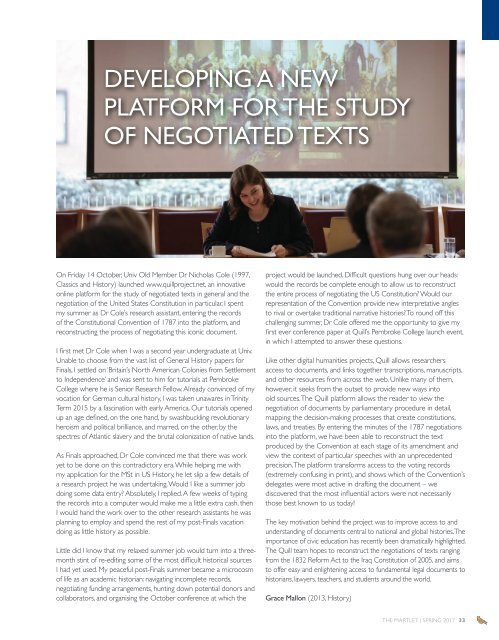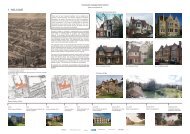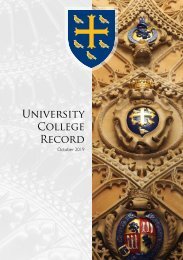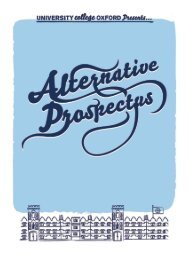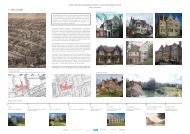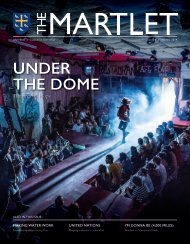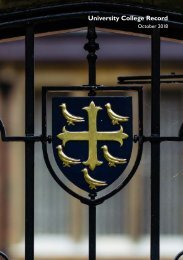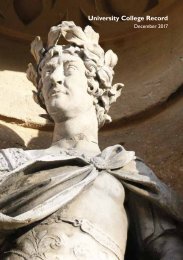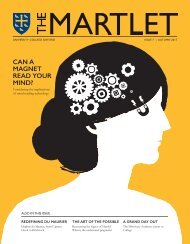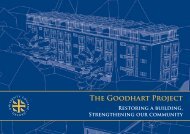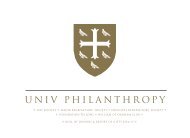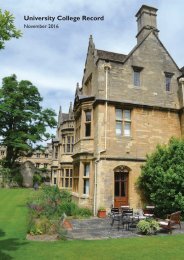Spring Martlet 2017
Spring Martlet 2017 V2
Spring Martlet 2017 V2
- No tags were found...
You also want an ePaper? Increase the reach of your titles
YUMPU automatically turns print PDFs into web optimized ePapers that Google loves.
DEVELOPING A NEW<br />
PLATFORM FOR THE STUDY<br />
OF NEGOTIATED TEXTS<br />
On Friday 14 October, Univ Old Member Dr Nicholas Cole (1997,<br />
Classics and History) launched www.quillproject.net, an innovative<br />
online platform for the study of negotiated texts in general and the<br />
negotiation of the United States Constitution in particular. I spent<br />
my summer as Dr Cole’s research assistant, entering the records<br />
of the Constitutional Convention of 1787 into the platform, and<br />
reconstructing the process of negotiating this iconic document.<br />
I first met Dr Cole when I was a second year undergraduate at Univ.<br />
Unable to choose from the vast list of General History papers for<br />
Finals, I settled on ‘Britain’s North American Colonies from Settlement<br />
to Independence’ and was sent to him for tutorials at Pembroke<br />
College where he is Senior Research Fellow. Already convinced of my<br />
vocation for German cultural history, I was taken unawares in Trinity<br />
Term 2015 by a fascination with early America. Our tutorials opened<br />
up an age defined, on the one hand, by swashbuckling revolutionary<br />
heroism and political brilliance, and marred, on the other, by the<br />
spectres of Atlantic slavery and the brutal colonization of native lands.<br />
As Finals approached, Dr Cole convinced me that there was work<br />
yet to be done on this contradictory era. While helping me with<br />
my application for the MSt in US History, he let slip a few details of<br />
a research project he was undertaking. Would I like a summer job<br />
doing some data entry? Absolutely, I replied. A few weeks of typing<br />
the records into a computer would make me a little extra cash, then<br />
I would hand the work over to the other research assistants he was<br />
planning to employ and spend the rest of my post-Finals vacation<br />
doing as little history as possible.<br />
Little did I know that my relaxed summer job would turn into a threemonth<br />
stint of re-editing some of the most difficult historical sources<br />
I had yet used. My peaceful post-Finals summer became a microcosm<br />
of life as an academic historian: navigating incomplete records,<br />
negotiating funding arrangements, hunting down potential donors and<br />
collaborators, and organising the October conference at which the<br />
project would be launched. Difficult questions hung over our heads:<br />
would the records be complete enough to allow us to reconstruct<br />
the entire process of negotiating the US Constitution? Would our<br />
representation of the Convention provide new interpretative angles<br />
to rival or overtake traditional narrative histories? To round off this<br />
challenging summer, Dr Cole offered me the opportunity to give my<br />
first ever conference paper at Quill’s Pembroke College launch event,<br />
in which I attempted to answer these questions.<br />
Like other digital humanities projects, Quill allows researchers<br />
access to documents, and links together transcriptions, manuscripts,<br />
and other resources from across the web. Unlike many of them,<br />
however, it seeks from the outset to provide new ways into<br />
old sources. The Quill platform allows the reader to view the<br />
negotiation of documents by parliamentary procedure in detail,<br />
mapping the decision-making processes that create constitutions,<br />
laws, and treaties. By entering the minutes of the 1787 negotiations<br />
into the platform, we have been able to reconstruct the text<br />
produced by the Convention at each stage of its amendment and<br />
view the context of particular speeches with an unprecedented<br />
precision. The platform transforms access to the voting records<br />
(extremely confusing in print), and shows which of the Convention’s<br />
delegates were most active in drafting the document – we<br />
discovered that the most influential actors were not necessarily<br />
those best known to us today!<br />
The key motivation behind the project was to improve access to and<br />
understanding of documents central to national and global histories. The<br />
importance of civic education has recently been dramatically highlighted.<br />
The Quill team hopes to reconstruct the negotiations of texts ranging<br />
from the 1832 Reform Act to the Iraq Constitution of 2005, and aims<br />
to offer easy and enlightening access to fundamental legal documents to<br />
historians, lawyers, teachers, and students around the world.<br />
Grace Mallon (2013, History)<br />
THE MARTLET | SPRING <strong>2017</strong> 33


